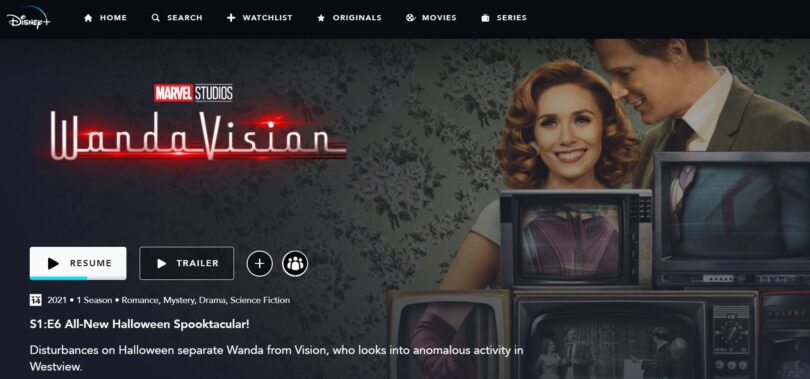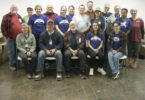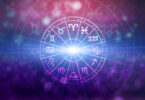SPOILER WARNING: “WandaVision” contains heavy references to previous films in the Marvel Cinematic Universe, especially “Avengers: Infinity War” and “Avengers: Endgame.” This review will discuss plot points in “WandaVision“ that reference previous works as well as certain plot points of the show itself that do not become apparent until later. Major spoilers for “WandaVision” will be avoided, however.
After more than a year since the release of “Spider-Man: Far From Home,” Marvel Studios premiered the newest installment of the popular Marvel Cinematic Universe with Jac Schaffer’s “WandaVision” on Jan. 15, releasing new episodes weekly, with the final episode being released on March 5. A spot originally intended for “Black Widow” in 2020, COVID-19 caused delays in the release of that film, “Eternals,” and the production of “The Falcon and the Winter Soldier” caused “WandaVision” to kick off what is known as Phase 4 of the franchise, putting the Disney+ series under a lot of pressure to satisfy viewers. Did it succeed?
The show starts with an intro to a 1950s sitcom that doesn’t exist, called “WandaVision,” starring the magic-practicing Wanda Maximoff (Elizabeth Olsen) and the A.I.-turned-powerful-android Vision (Paul Bettany) as a married couple in the suburban town of Westview, New Jersey. Immediately the audience is expected to know something is amiss, as Vision was killed in “Avengers: Infinity War,” and the show does nothing to address or acknowledge this at this point. In fact, the entire episode is a very accurate and rather amusing representation of a sitcom from that era as opposed to standard Marvel action fare. The best way to explain “WandaVision” would be to give an overview of the first episode.
Instead of Wanda blasting bad guys with magic, she uses it to clean and sort the dishes, before accidentally breaking one on Vision’s head as he walks by; instead of Vision fighting evil with beams of energy from the powerful stone in his forehead, he uses his powers to quickly get his work done while others aren’t looking. The main conflict is actually rather mundane, with the two mistaking a marked date on their calendar for their anniversary, when actually the date was marked as a reminder for a dinner with Vision’s boss. Hijinks ensue as the two attempt to fix dinner, but everything turns out fine in the end with a little help from their comically-nosy neighbor Agnes (Kathryn Hahn). That is, until Vision’s boss starts choking, his wife doesn’t stop laughing and suddenly the camera work and even the show’s aspect ratio become much more akin to a film than a sitcom. While Vision saves his boss and things go back to normal, it once more becomes apparent things are unwell. Vision gets a promotion, he and Wanda sit on the couch and the credits roll over the happy sitcom ending. Just then, the camera pulls out, and reveals someone within the Marvel universe is in fact watching the broadcast and the real credits start.
Things escalate from here.
The show as a whole follows a pattern. Each episode features a pastiche of sitcoms from a certain decade, with episodes stylistically referencing “Bewitched,” “The Brady Bunch,” “Malcolm in the Middle” and “Modern Family.” Each episode has the sitcom interrupted by something, like a radio transmission, until about a third through the series the focus becomes split between the sitcom and those investigating the phenomenon, such as FBI Agent Jimmy Woo (Randall Park), astrophysicist Dr. Darcy Lewis (Kat Dennings), and S.W.O.R.D. Captain Monica Rambeau (Teyonah Parris), all of whom are working under the orders of S.W.O.R.D. Acting Director Tyler Hayward (Josh Stamberg). All of these characters are rather important, and Marvel fans may recognize the characters of Woo, Lewis, and Rambeau from their previous appearances in the Marvel Cinematic Universe. The last third of the series has the boundaries between these plots begin to fall, as twists, turns, confrontations and explanations round the show off.
Some may feel the show starts explaining things too early, but I feel the split perspective injects more mystery and tension into the plot, while the sitcom segments continue to be both legitimately funny, impressive in their accuracy and unsettling whenever something goes “off-script” so to speak. Even “scripted” sequences can get odd, such as an episode revolving around Wanda’s spontaneous pregnancy that results in the birth of twins within a day, or how those same twins age from infant, to toddler, to 10-year-olds over the course of another. Fake ads even interrupt the show to reference previous films as well as poke fun at the ads of the time period.
Another note of praise are the performances of Olsen and Bettany. They both transition from action heroes to sitcom stars brilliantly, dropping in and out of the more serious interpretations of the characters when the scene demands it and successfully pulling off the husband-wife dynamic of each decade, from perfect couple to dysfunctional marriage. Hahn also manages to be the doting neighbor across decades in the same way, with her later drama and action scenes being quite entertaining. While Park, Dennings, Parris, Hayward, and the residents of Westview all give very good performances, they are much more locked into one tone or the other. Julian Hillard and Jett Klyne also do well in their roles as twins Billy and Tommy, never becoming grating and instead acting like mischievous, but well-meaning and concerned sons to Wanda and Vision.
Major negatives of the show are that the final action scenes leave something to be desired, and may come off as obligatory to some viewers. I personally enjoyed how Vision resolved the conflict with his antagonist, but Wanda’s fight was mildly underwhelming, though the real conflict for her wasn’t really the fight at all, but the circumstances surrounding it. Secondly, as previously mentioned, it relies a lot on continuity with previous Marvel films; while this will please long time fans, it may turn off newer viewers unfamiliar with the characters or events who don’t want to take the time investment to watch other movies beforehand, even if a lot of events are loosely explained in the show and the “Marvel Studios: Legends” recaps on Disney+. The significance of a character played by Evan Peters will also be lost on people who are unfamiliar with the separate X-Men film franchise. Similarly, “WandaVision” sets up plot points for later works to continue, which may upset viewers looking for more contained stories, especially since Olsen’s character is set to return in the upcoming “Doctor Strange in the Multiverse of Madness.” Even on its own, the show is about 5 hours, 30 minutes long, making it about as long as both “Avengers: Infinity War” and “Avengers: Endgame” combined, though being split into episodes may help viewers pace themselves.
“WandaVision” proves that Marvel Studios is capable of more than just action films. A character-driven story drives most of what makes the series great, and it indicates great potential in other stories told in its world, both in film and with a miniseries. Fans of previous Marvel Cinematic Universe works will love it, and newcomers interested should give it a try. Just make sure you watch it with a friend familiar with what’s going on, if that’s the case and watch out for mid-credits scenes in the last 3 episodes.
“WandaVision” is currently streaming on Disney+.







